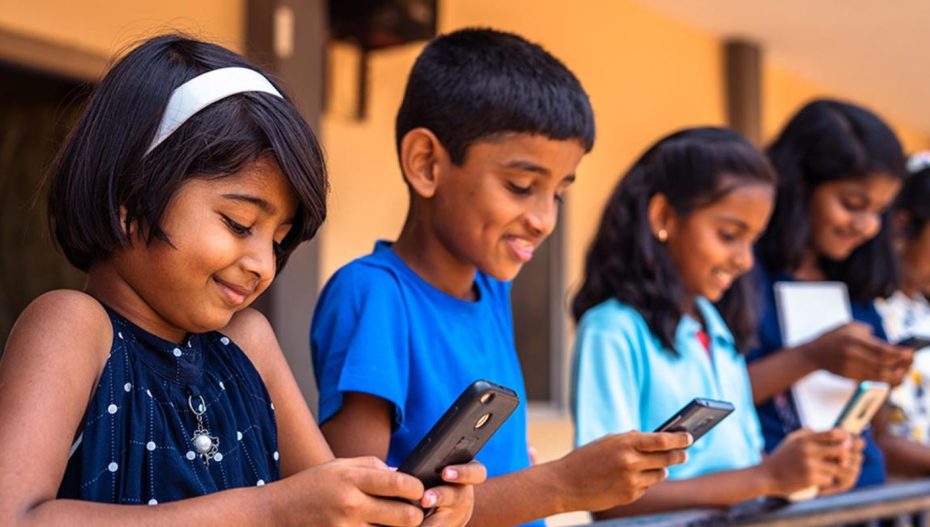Anjali (name changed),13, came to us with the problem of excessive phone use. She would get angry and even physically violent if her family members tried to restrict phone use. She had created an Instagram account without her parents’ knowledge through which she was communicating with strangers.
Anjali developed a phone addiction after a change in school and some bullying experiences with peers. She was academically brilliant but her grades had started slipping. Phone use seems to have been a way to manage loneliness, become popular at school, and express anger towards parents who she felt didn’t care for her beyond her academic performance. She was unwilling to engage in therapy so treatment was focused on rapport and motivation building. Parents were psycho-educated about the role of family conflicts and the need for consistent parenting.
– Case related by Dr Manoj Kumar Sharma of SHUT Clinic, NIMHANS, Bengaluru
This is an era when smartphones are omnipresent among all age groups. Yes, including young children. While a heated global debate is raging on what is the appropriate age to give a child a smartphone, statistics tell us a disturbing story.
A 2021 study by the National Commission for Protection of Child Rights (NCPCR) covered 3,491 school-going children in the 8-18 age group from 60 schools in India. As per the study findings, 62.6% of the respondents use their parents’ phones while 30.2% have their own smartphones.
An alarming finding was that when it comes to social media accounts, 37.8% and 24.3% of 10-year-olds have Facebook and Instagram accounts respectively. This is despite the fact that the platforms require an account holder to be 13 years old.
When asked about the features that children like to use on smartphones, 52.9% answered “chatting” (using instant messaging apps like WhatsApp/Facebook/Instagram/Snapchat). Only 10.1% of children like to use smartphones for online learning and education.
According to Ofcom, the UK’s communication regulator, 25% of children between five and seven years old in the UK have their own smartphone! More than 4,000 concerned parents in the UK have joined a WhatsApp group called ‘Smartphone Free Childhood’. The group is committed to barring young children from having smartphones due to growing concerns about online safety and the impact of social media on mental health.
In the US, there are 55,000 parents who have taken the ‘Wait Until 8th pledge’. It empowers parents to rally together to delay giving children a smartphone until at least the end of the 8th grade.
Problem of addiction

Dr Manoj Kumar Sharma heads the SHUT (Service for Healthy Use of Technology) Clinic at the National Institute of Mental Health and Neurosciences (NIMHANS) in Bengaluru. “Out of 20 cases we see every week for excessive use of smartphones or smartphone addiction, 7-8 are in the 12-15 age group,” he says.
“The major issue is gaming. Young children are also active on YouTube and Instagram and watch reels and videos. By 14 years they are exposed to pornography. Many complain that their family does not understand them. Children are not able to talk to parents freely. That’s one reason they take to social media. At times, social media and gaming is an escape from academic pressures,” explains Dr Sharma.
To help, it is important to understand the child and be non-judgemental in attitude. It’s important to make them feel comfortable so that they open up. “We ask them reasons for excessive use of smartphones. How do they feel after use? We ask them whether they realise the negative side of technology. We use control-based strategies to reduce time spent on smartphones. We build family support for the child. We are able to achieve considerable lifestyle change when it comes to use of smartphones,” he says.
Rewards and risks

The CEO of Kalorex group, educationist and author Dr Manjula Pooja Shroff says: “Young children having access to smartphones can lead to eyesight issues and problems of attention span. This could impact their school work. I think the topic of giving children a smartphone should only come up when they enter the pre-teens.”
Of course, the rewards associated with using a smartphone are quite a few. The device can help the child build a contemporary learning skill set, including analysis, research, programming and coding, says Dr Shroff.
However, the flip side should be considered too. “The risks are very alarming. Some of them are exposure to pornography, body shaming, cyber intimacy, cyber bullying, love crimes, and deaths caused by dangerous gaming,” she warns.
Maturity of child

Mamta Mangtani teaches English to classes 9 to 12. “According to me, there is no specific age when a child should be given a smartphone. The right time is when a child is mature and confident enough to use one. He or she must be aware of the pros and cons,” says Mamta.
Smartphones do help in education. Also, parents can keep in touch and know where their child is which addresses the safety aspect. Another positive is that when a child is out of town and doesn’t have a laptop; he can work on his phone. The negatives are watching inappropriate content while surfing. Also, watching reels and videos can become addictive,” she says.
Adverse effects
While there may be educational apps and tools on phones that can help in learning, the negative aspects of giving a child a smartphone too early are many. While smartphone addiction is a real and serious disorder, here are some other adverse effects:
- Excessive use of smartphones can lead to eyesight and attention span problems in children due to overstimulation.
- Constant use can hamper free play vital for the wholesome development of young children.
- Being on a phone is a sedentary occupation and as such discourages physical activity and outdoor play.
- If a child is hooked to a smartphone, she may not mix with peers and adults, and may not develop social skills.
- Children who are constantly on their phones fail to cultivate other interests like reading, drawing, music or sports.
- Smartphones expose young children to a world that they are not ready for. They can be exposed to nudity and violence which can have a detrimental impact on their mental health.
- Constant social media use by young children can lead to their developing anxiety and depression.
- Use of smartphone around the bedtime could lead to poor quality and quantity of sleep.
- This is shockingly true. Excessive screen time on the phone can physically alter the brain, impairing cognition.
- If kids are constantly on their mobiles, it can undermine family relationships.
Is 14 the right age?

Ripal Mehta, an entrepreneur who runs a home baking venture, has a son aged 12 years, Mahir. “In my opinion parents should give their child a mobile at 14 years of age. Even now, homework assignments are sent by my son’s school on WhatsApp. He accesses them through my phone. I think there are pros of children using smartphones. Children can explore many educational tools. However, there are serious negative aspects. Two major ones are the adverse impact on eyesight and exposure to inappropriate content. Parents are in a dilemma,” says Ripal.
Mahir does ask his parents for a phone of his own since all his friends have smartphones. “Smartphones are useful for studies. You can google and find out something you don’t know. I play games occasionally. The negative point is that my eyes burn if I spend too much time on a phone or a laptop,” he says.
‘It’s a fun life without a phone’

Ten-year-old Tamanna loves reading and art. “Many of my friends have mobile phones. One friend brings her phone along when she comes to the park. She doesn’t mix with other children but keeps busy on her phone. Two negatives of having a smartphone at a young age are mobile addiction and picking up bad language. I don’t miss not having a mobile. It’s a fun life without a mobile phone,” says Tamanna.
Her mother Tuli Banerjee is an entrepreneur and social media influencer. “Young children should not be given a mobile phone. I have read about how swift changes in lights and colours that happen on a mobile screen cause attention problems and restlessness in children. I have observed children are often given mobile phones to keep them occupied at social events like weddings. As a result, they do not develop social skills. I think the right age to give a child a smartphone is 14 plus years,” says Tuli.
Smart watch is an alternative

Love Joshi, certified Mindfulness Meditation trainer and energy healing therapist, has a 10-year-old daughter, Kiara. “A child should have a smartphone after he or she passes class 10. We have got Kiara a smart watch. It does not have any apps. She can only make and receive calls from people whose numbers we have saved on it. It helps us keep in touch with her when she has gone for classes. My number is registered in the school to receive homework,” says Love.
He believes that WhatsApp can be an unsafe platform as someone unknown can send questionable material. Some reels and videos have inappropriate content. Under adult supervision, children can learn a lot using a smartphone, Love acknowledges. Kiara uses language learning apps. She also watches music and dance videos on YouTube videos as she learns these arts, says her father.
“Most of my classmates have a smartphone they use at home. They play games, watch videos, and also make videos and reels. They are on WhatsApp and other social media sites,” says Kiara.
Trust in children

Kamal Gupta Roy is a data analytics professional. She has two children, Prisha aged 15, and Aarav aged 13. “We first gave Prisha a phone because she was going on a two-week school trip and needed to be in touch with us. I notice that when we go to restaurants, many parents give their young children phones to keep them busy. I am mystified by this behaviour. After all, the family members have come out for dinner to spend time with each other. Then, why give your child a phone?” asks Kamal.
“Both our children have their own phones now. As parents, we believe our children are mature enough not to get diverted to watch inappropriate content. We trust them to be sensible,” she says.
“Phones are useful when it comes to discussing group projects. We also get our assignments on WhatsApp. Smartphones help in communication and there are several educational apps. The negatives are Instagram scams, cyber bullying and eye strain,” says Aarav.
“YouTube can become addictive. But with parental supervision, smartphones can be a helpful tool for learning. But it does affect socialisation. I recollect an incident when we were having dinner with a child who was younger than us. She was constantly on her phone (hidden behind a book!). She would give short answers to our questions and then go back to her phone,” says Prisha.
Finally, to deal with some of the negatives, parents can initially get their child a smart watch or a device with GPS (to track a child’s whereabouts for safety purpose). This device can’t be used for accessing social media, texting, gaming, or surfing the web. Another option is to put parental controls on the smartphone your child is using. It is essential to address the problem in a multi-pronged manner so that children do not lose out on their childhood…
Also Read: The Power Of Daily Rituals And Why You Should Have Them Too













